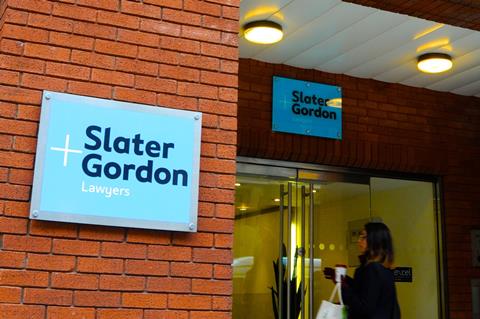National firm Slater and Gordon has won a significant victory in a challenge from hundreds of former clients who argued they did not give informed consent to deductions from personal injury damages.
In a ruling likely to be welcomed by other PI firms facing costs challenge, Senior Costs Juge Rowley said Slater and Gordon had used a ‘perfectly appropriate method’ for explaining what claimants were signing up for and that they understood the key information they had been given.
Key terms were set out in the contract ‘clearly in plain and intelligible language’ and the conditional fee agreement documents were in a standard format which has been used for many years.
A total of 224 individuals brought claims in Richardson & Ors v Slater & Gordon UK Limited against the firm, of which 10 were selected as test claimants. The hearing was conducted on nine preliminary issues, including whether there had been a failure to obtain informed consent for deductions or to provide information about the potential liability to pay Slater and Gordon’s costs.

Read more
From the outset the judge made clear that the witness evidence from the claimants was of limited use, given that their accidents had occurred six to eight years previously, and none had made notes of conversations with Slater and Gordon.
The clients had been onboarded following a call with a Slater and Gordon representative, the court heard. Call handlers would explain the meaning of no win, no fee and outline the terms of the CFA, which included deductions capped at 25%. While potential claimants were on the line, a pack of documents would be emailed and explained: in one case the time between the pack being emailed and the client signing documents electronically was five minutes and seven seconds.
Rowley said that having heard them give evidence, there was no doubt that the claimants did not look at the documents to any great extent when they were emailed following a telephone call with Slater and Gordon. ‘It seems to me that this makes it difficult for the claimants to argue that if they had been provided with more information they would have done something else,’ added the judge. ‘It is abundantly clear that they did not engage to any great extent with the information they had been provided with in any event.’
The judge said the claimants had not given any reason why a long and detailed oral explanation of the documents was necessary in addition to the wording of the documents themselves.
In addition, none of the witnesses had convinced the judge they felt under pressure to sign.
Rowley added: ‘I got the distinct impression that the claimants were keen to get to the end of the process on the call but were given time to look at things if they wanted to do so. They were not pressured to complete the process.’
Slater and Gordon said the ruling vindicated the firm’s approach to ensuring that clients fully understand the way in which claims are funded.
A spokesperson added: ‘We have repeatedly stated in response to these challenges that we reject any suggestion that former clients had been pressured to sign up to retainers or that the retainers were defective in some way. We are pleased that the costs judge found, expressly, that there was no pressure to complete the process and that the retainers were found to be fully enforceable.
‘We always ensure that our clients have the information that they require to make informed decisions, particularly in relation to their legal costs.’
This article is now closed for comment.



























19 Readers' comments